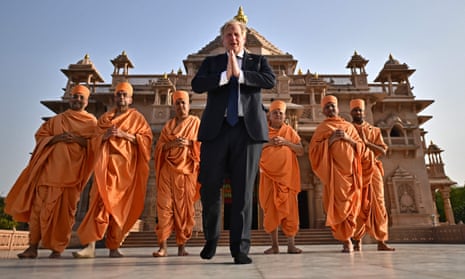Boris Johnson is in serious trouble. He faces danger on all fronts. His capitulation to the Commons privileges committee leaves him open to the risk of being found lying to parliament. Resignation would have to follow. Beyond that, he has the May elections and further penalty notices ahead. Even his talents as a political Houdini will be tested.
The issue is not what he did. No one doubts that there were rule-breaking gatherings in Downing Street during coronavirus restrictions. Proof enough lay in the resignations that followed their disclosure. In December last year, Sue Gray was asked, quite unnecessarily, to see whether they were true. The Metropolitan police then did likewise, proceeding with inexcusable delay, as if the culprits were an elusive and secretive mafia. This favoured Boris Johnson’s strategy of playing bad news long, hoping for luck and events to postpone any day of judgment. The home secretary, Priti Patel, should have ordered the police to resolve this matter immediately months ago. It is suspicious that she did not.
I at first assumed that Johnson’s lifelong tactics would see him through. He would fumble and lie and delay. He has duly used the Met’s dilatoriness to silence Gray and consign her to history. He has fled the scene to Ukraine and now taken refuge in a JCB factory in India. He has invoked the aid of Vladimir Putin, the cost of living crisis and the virtues of political continuity. He ordered his MPs to stall a vote to refer him to the privileges committee, in what appeared to be a tacit acceptance of guilt, but that transparent delaying tactic quickly fell apart in the face of accusations of a cover-up. Tory whips withdrew their blocking amendment, allowing the Labour motion to pass and the examination of Johnson’s actions by the privileges committee to proceed. Politicians lie to the Commons all the time, but with a subtlety that eludes Johnson. If he was innocent, he would have referred himself to the committee.
This is not over. If one fixed-penalty notice can yield the past week’s pandemonium, what of the next multiple notices, all reputedly more serious? There is no question of guilt, only of punishment. In the middle ages, political executions were preceded by a prolonged ritual of hanging, drawing and quartering. Death was postponed amid screams of pain to enlighten and entertain the populace. Today’s torture is psychological, leaving Johnson’s face pallid with daily torment. Keir Starmer can barely suppress his glee. The Labour leader works himself into a froth, his vitriol sprayed over Johnson beyond that of any opposition leader in my memory. But then, Starmer cannot really want Johnson to resign. He would be mortified to lose such a heaven-sent target before the next election. Rishi Sunak would make a hopeless victim of his abuse.
Tory MPs are so far more opaque, though bellwether Steve Baker has made his feelings known. Local elections in Britain have become opinion polls rather than expressions of lower-tier democracy. Those forthcoming in May are Johnson’s next day of reckoning. Even assuming Johnson evades an adverse judgment from the privileges committee, his colleagues seem increasingly likely to realise that they are going to need a new leader, and soon, but preferably not until a plausible alternative is on offer. They appear ready for the time being to play along with Johnson’s can-kicking buffoonery, but their humiliation before the electorate can go on only so long. Polls suggest two-thirds of the public want him to go if fined again.
The country at large must now accept that the future of the government depends on an indefinite series of fixed-penalty notices, as ordained by a currently leaderless London police force. This is, of course, democracy. The US’s leadership once hung on an act of fellatio. But the question remains open as to how Britain should be led through a period of acute strain infecting all areas of the state.
The prime minister has no programme, no strategy, no professed ideology: only a frantic search for survival. In a revealing aside last Tuesday, Johnson argued that this was demanded by circumstance. Whenever challenged, he refers to the war in Ukraine, as if this was Britain’s business. A war is handy for any prime minister. Thatcher’s leadership in 1982 was rescued by the Falklands war. David Cameron wanted to go to war in Syria and went to war in Libya. But these prime ministers were conducting or proposing conflicts on their country’s behalf.
Ukraine is not Britain’s war, thank goodness. It may be that Johnson would dearly love to swap places with Volodymyr Zelenskiy. But it is outrageous that he feels he can periodically lecture him on what he should or should not concede to Russia. That is not Johnson’s business, any more than underpinning his leadership struggle is Zelenskiy’s. In fact, Johnson’s most distinctive contribution to Ukraine’s plight has been to deny an open door to Ukrainian refugees, leaving in place the Home Office’s “hostile environment” to all European migrants. Nothing must breach Brexit’s aversion to foreigners, however desperate their plight. Yet, as Johnson turns away the refugees, he could fly for a picture opportunity with Zelenskiy in Kyiv. Even Emmanuel Macron did not descend to such a stunt.
That stable leadership is advisable when the economy is in trouble is beyond argument. But Johnson is not in control. He leaves Downing Street almost daily to wander the country in a desperate search for photo opportunities for the evening news. He deports asylum seekers and reverses energy policy. He attacks the archbishop of Canterbury. Every utterance drips with self-righteousness.
The British economy currently rests in the hands of Rishi Sunak. His inexperience has led him to make mistakes, but he is a competent chancellor facing the toughest challenge in a generation and needing constant support. He did not deserve to be paraded as Johnson’s accomplice in the last fixed-penalty ritual. The last thing he now needs is a boss teetering almost daily on the edge of downfall.
The security of any prime minister should not turn on a random mistake or misdemeanour. Downing Street is a job under phenomenal pressure, besieged by a catalogue of accidents and errors, not all of the prime minister’s making. Over Partygate there was some justice in Johnson’s plea that its criminality did not merit the penalty of resignation. But that excuse needed to be deployed instantly and sincerely in a burst of confession and apology.
Johnson’s error was not to do that. Denial was buried deep in his narcissism. He fell back on a conviction that he could bluff and squirm his way through what should have been a passing crisis. In doing so he has subjected his country to a distasteful farce that has lasted six months and is not yet over. It is that farce that has deflected attention from Ukraine, the economy and the cost of living. Partygate has thus confirmed the view that Johnson was never fit for the office he holds. At an appropriate moment his friends should advise him not to seek re-election, but simply resign.
Simon Jenkins is a Guardian columnist

